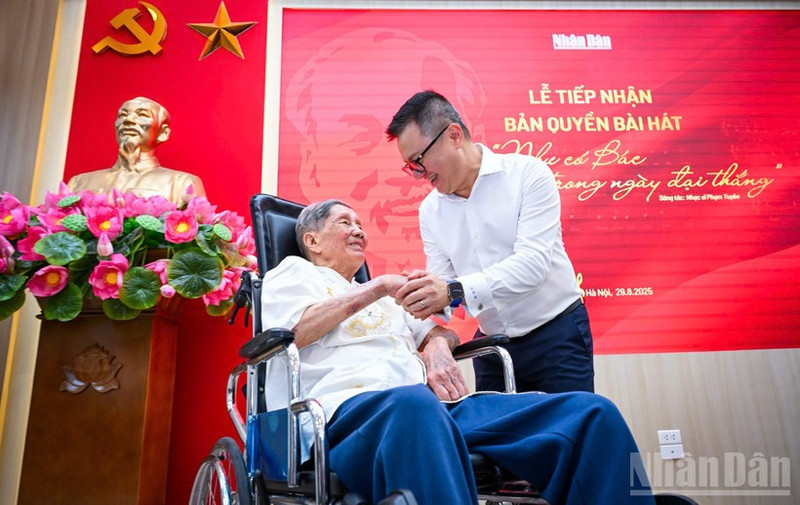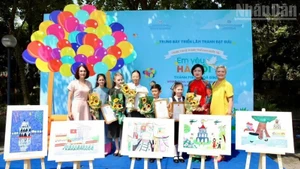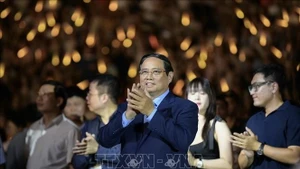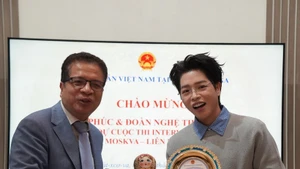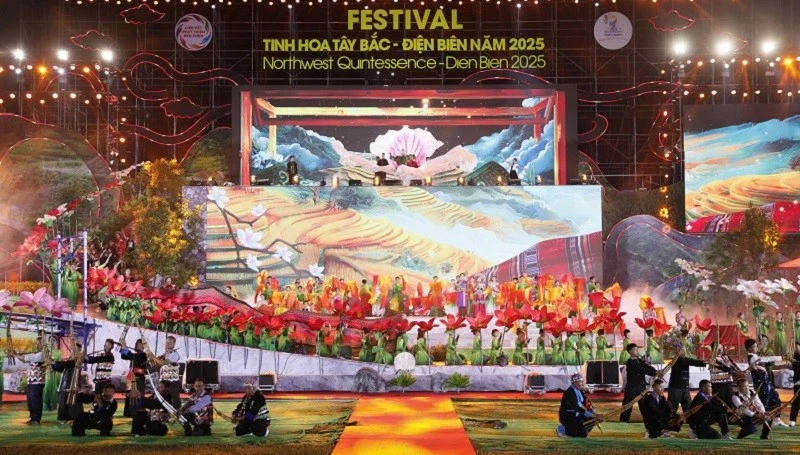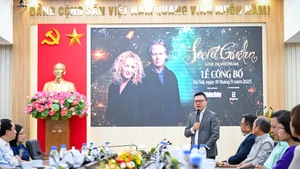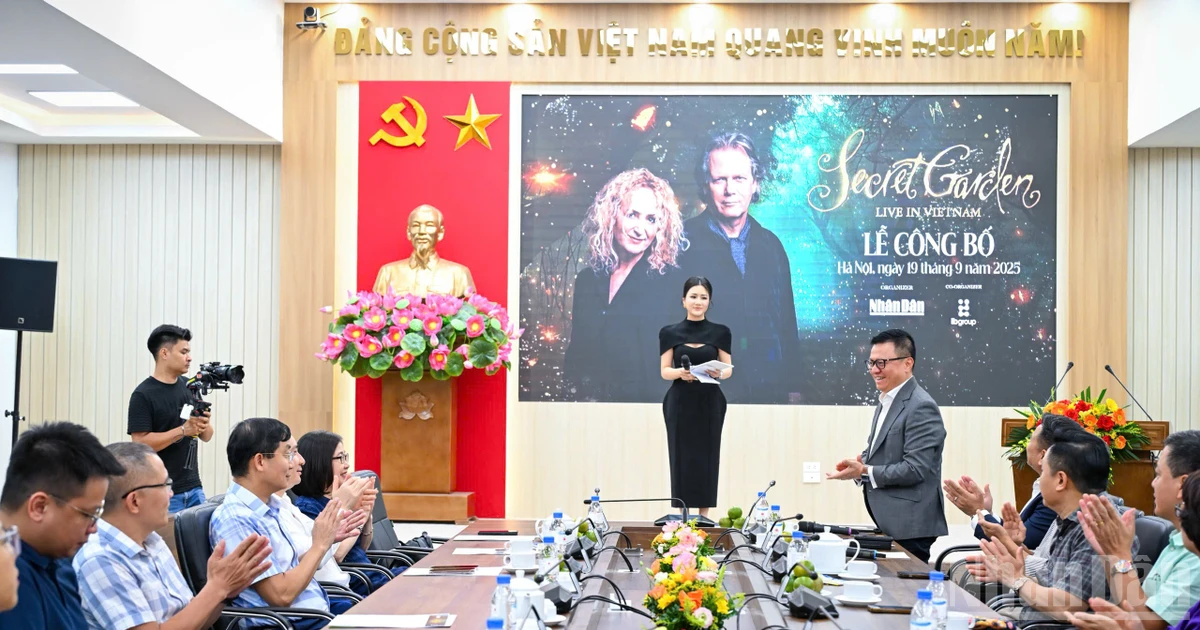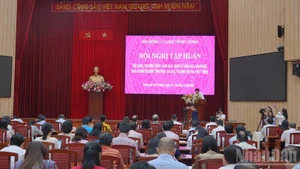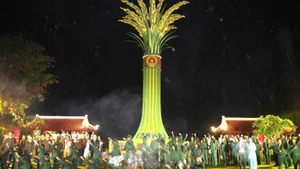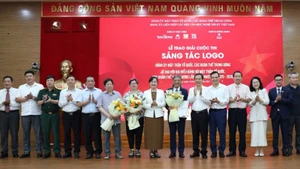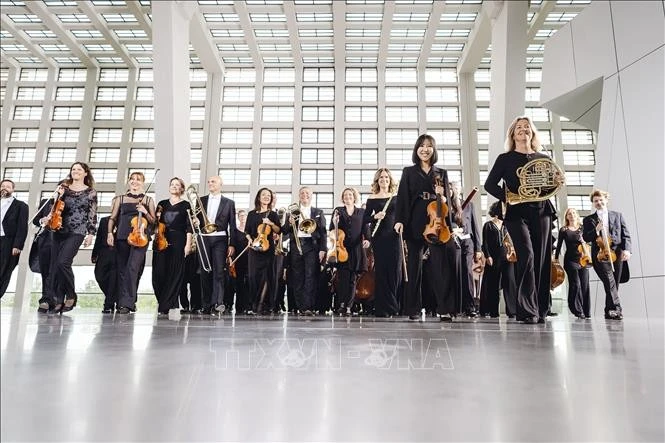From the historic moment in 1975 when the song was first printed on the newspaper page, to today when it returns to the editorial office, that immortal song continues its journey of persistent spread, as a symbol of faith, love and the strength of national unity.
A trusted address
At the event where musician Pham Tuyen presented the manuscript and copyright of the song “As if Uncle Ho were here on the Great Victory Day” to Nhan Dan Newspaper, Pham Hong Tuyen - musician Pham Tuyen’s daughter, shared her emotions: “On behalf of the family, I would like to express my gratitude and send a wish: To return the song “As if Uncle Ho were here on the Great Victory Day” to a worthy place to preserve and spread - that is Nhan Dan Newspaper, the mouthpiece of the Party, the voice of the people”.
She emotionally said: “In the family, we often tell each other that “As if Uncle Ho were here on the Great Victory Day” is a song of the people. My father always kept in mind: Music only truly lives when it belongs to the public. Therefore, when we decided to give all the rights to manage and use the song to Nhan Dan Newspaper, it was a way to continue that spirit”.
According to Tuyen, this decision is not the end of copyright, but a comma in the journey of spreading the song. From the hastily written page in the hallway of the apartment building, through the hearts of the people, to an agency representing the voice of the people to continue to go further, more persistently and more clearly.
Although every year, musician Pham Tuyen still has a fairly stable source of copyright income, about more than 100 million VND, his family still accepts to put aside economic benefits.
“This is my father’s wish and also the family’s unity. We believe that under the management of Nhan Dan Newspaper, the song will continue to resonate in the right place, at the right time, in the right way: During major holidays, in classes, in moments when the community needs a spiritual support; and also in everyday moments when we want to remind each other of the values of peace and independence,” she emphasised.
What moved her most was the moment her father signed the decision to award it. “Normally, due to his old age, my father’s hands trembled a lot. But that day, he seemed to have been given more strength to write clearly: Presented to Nhan Dan Newspaper / Signed/Pham Tuyen. Perhaps my father was truly happy,” she recalled.
With the same thought, Major General, musician, President of the Viet Nam Musicians’ Association Duc Trinh affirmed: “The family of musician Pham Tuyen gave the right to manage the song to Nhan Dan Newspaper with special meaning. Because, as early as May 2, 1975, Nhan Dan Newspaper printed this song in the newspaper, just two days after the great victory. Now, the song returns to the Party’s newspaper, the voice of the people, further highlighting the symbolism that this is a ‘song of the people’, which has resounded throughout the country.”
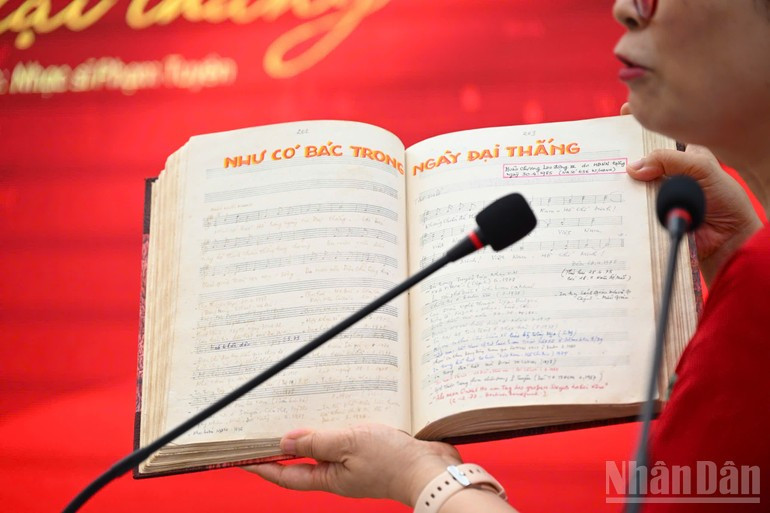
Trinh believed that Nhan Dan Newspaper is the most trustworthy and worthy address for the musician’s family to entrust not only the handwriting but also the copyright of the work, so that they can continue to promote, exploit and spread the song, especially to the younger generation.
The Viet Nam Musicians’ Association will always accompany Nhan Dan Newspaper in the work of preserving and promoting, so that the song lives true to the spirit of being the voice of the people, the melody of the joy of the great victory of the Fatherland.
According to him, Nhan Dan Newspaper’s acceptance of the management rights of the song will further ensure that the song spreads widely in the country and the world.
He emphasised: “Copyright is not the most important thing, what is important is how to use it. For example, in the event “Fatherland in our Heart”, the song was played at the end, and more than 50,000 audiences sang it in unison. It was an extremely emotional moment, affirming the song’s enduring vitality. This is the perfect ending for the programme, and also the opening point for the song to continue to be sung in many places and many generations.”
The song that lasts forever with the Vietnamese people
Recalling the moment more than half a century ago, the daughter of musician Pham Tuyen said that in the last days of April 1975, when the whole country was waiting for the moment of reunification, musician Pham Tuyen wrote the song in a single night.
After only two days, on the afternoon of April 30, 1975, the song was recorded and broadcast on Radio the Voice of Vietnam at the moment when the whole nation burst into joy of victory. From that moment, the song entered the memory not only as a melody of the times, but also as a common cheer of the nation.
Pham Hong Tuyen emphasised that the song’s lasting vitality originated from its simple, familiar name. In that momentous moment, every Vietnamese person seemed to see Uncle Ho’s figure in their own joy, from the path of independence that Uncle Ho had shown, to the simple but steadfast advice about a free, independent and happy Viet Nam.
“The song therefore transcended the scope of a work of art, to become the common voice of the entire nation,” she said.
The journey of the song is also the journey of the people. Just two days after the victory, Nhan Dan Newspaper printed the entire song in the issue published on May 2, 1975, opening the way for that melody to spread from schoolyards, rooftops, squares to international festivals in Italy, the German Democratic Republic, the Soviet Union, Japan, Czechoslovakia... Then when it was included in textbooks, the song entered the lives of many generations of students as an emotional lesson about history.
Recalling his personal memories, Major General and musician Duc Trinh emotionally recounted that he himself was a direct participant in the 1975 Campaign and had heard the song in the first days in Saigon.
“The song only had a few lines but anyone could sing it. It was a work that was concise, artistic and professional. It touched everyone’s hearts because it expressed the joy of independence,” he recalled.
For his part, musician and Chairman of the Vietnam Union of Literature and Arts Associations Do Hong Quan expressed: “Our generation is inspired by our predecessors on the path of professional music. Ever since our youth, the melody of the song echoed throughout the streets of Ha Noi, becoming a rich source of inspiration for those who work in composition.”
He said that those are unforgettable memories, associated with the sacred moment of the Fatherland - the day the South was completely liberated, the country was unified, opening up independence and freedom.
“That song has followed us throughout our musical journey, as a part of our memories, a source of energy added from the historic victory”, he emotionally shared.
Musician Do Hong Quan expressed his deep gratitude to musician Pham Tuyen, who wrote a song that has gone through the years, becoming a spiritual baggage for many generations.
He affirmed: “This is a great contribution of musician Pham Tuyen to the Party, to the people and to the literary and artistic world. That work not only evokes generosity, faith and hope, but is also an example for young musicians to follow, creating works of everlasting value”.
With such contributions, musician Pham Tuyen deserves to be considered a “giant tree” of Vietnamese music, who left behind a valuable legacy that contributed to nurturing the belief and aspiration for a prosperous era of national development.
